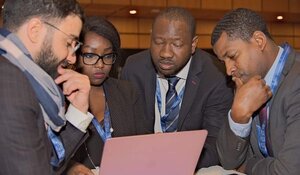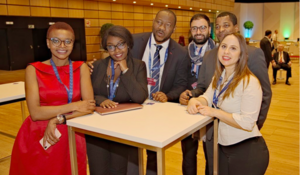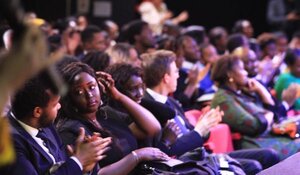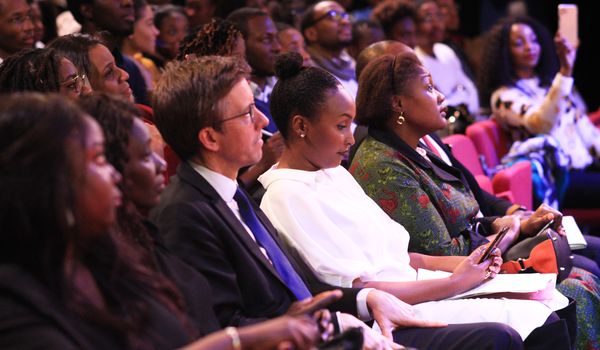The 6th Heads of State Summit of the African Union (AU) and the European Union (EU) will take place in February 2022, the youth intend to take an active and vocal place in the process. Youth Summits/Meetings have been always held weeks before the Head of State Summits took place.
A pivotal moment: Abidjan Youth Summit in 2017 - designing the Youth Agenda
Together, African, European and Diaspora youth, aimed at highlighting the role they played in the economic and social development of young people in both continents. In Abidjan, “Investing in Youth for Accelerated Inclusive Growth and Sustainable Development” was seen as a necessary condition to build a sustainable future. This involved, working collectively towards the issues preventing progress within our interconnected societies and moving forward together.
The "Abidjan Declaration" written by youth organizations gave several recommendations to the African and European heads of states urging them to invest in youth in order to guarantee a sustainable environment for generations to come.
Strategic themes were developed in order to provide a "roadmap" and a sort of compass for African and European leaders. Our remarks were well welcomed resulting in the creation of a follow-up program: the Youth-Plug In, that gave 36 Youth Summit participants the possibility to continue working in clusters on priority topics. This process birthed a specific fund for youth organizations on both continents. However, as the funding is not accessible for all youth organizations, a respective adaptation of this fund is necessary.
Youth inclusion in the new AU-EU partnership

In the Joint Communication to the European Parliament and the Council of Europe presenting the 6th Heads of State Summit emphasis was also placed on youth and the large catalysts for youth development: education and employment.
In order to further youth inclusion in the processes implemented for the new partnership between the AU and EU, the best strategy would be to find a structural way to pivot from the Abidjan Youth Summit outcomes. We need to advocate for the three youth (European, African and Diaspora) to be given the opportunity, spaces, and funding to work on common projects permanently and on a long-term basis. This would allow youth organizations to improve their collaboration, to reach impactful results and to become efficient actors in the AU-EU partnership.
Youth Dialogue Spaces on both continents
The upcoming AU-EU Summit is strategic and it takes place in an unprecedented and challenging environment. The African Diaspora Youth Forum in Europe (ADYFE) recommends that Youth Dialogue Spaces on both continents should be created and an adequate, long-term funding should be provided. Thereby youth organizations could be involved in the AU und the EU process permanently. We believe that expanding our joint projects outside of the summits is one of the keys to introduce our own youth agenda. Youth organizations should be active participants in discussions regarding today’s challenges.
In addition, a very strong youth policy is key. In general, youth demands haven't changed since the Summit in Abidjan. However, since the beginning of the global pandemic, youth, with regard to the accessibility of education, employment, and equal opportunity, has been severely affected. We have seen how this crisis has amplified global inequalities, condemning those depending on the informal economy to remain without income for several months.
Not to forget that the traditional, state-funded education system often failed: schools were closed for several months during lockdowns, preventing less privileged children from basic education. Another negative effect was/is an increase in drop-out rates. The reasons for this negative impact can be found in the increase of poverty due to loss of income opportunities . With this in mind, youth expect very strong commitments from world leaders when it comes to protecting their rights and promoting a safe and enabling environment for youth growth.
African Diaspora Youth in Europe (ADYFE) as a change agent

Young people working within ADYFE have the peculiarity that they belong to both, their country of origin and their country of residence. They understand cultural codes in both countries which can be seen as an asset when it comes to developing projects on both continents.
For several years, even decades, diaspora youth has been working to enhance and bridge the gap between both continents, especially when it comes to social or economic development. They should be recognized as active, undeniable and indispensable actors in the different dynamics created. Diaspora youth has the potential of a change agent in the partnership between Africa and Europe, and can therefore contribute to more equality and fairness. Indeed, throughout the years, ADYFE has been functioning as a bridge between both continents while organizing its annual conferences where decision makers and stakeholders from Europe and Africa are discussing different youth policies to promote youth entrepreneurship and employment. These events are an opportunity for young people to promote their projects and initiatives on both continents. However, when it comes to the distribution of funds, diaspora youth seems to be left behind in the different programs created.
ADYFE’s view on the upcoming AU-EU Summit
In ADYFE, we think that it is crucial that the voice of youth is heard and more importantly understood. It is important for us to involve youth in policy and decision making regarding their development and wellbeing. Only then, their demands will be better understood and included in the policy making, programming and funding.
ADYFE, alongside the European Youth Forum and the Pan-African Youth Forum (the latter until 2017), has been involved in the organization of the Youth Summit for several years now.
Our goal is to represent the voice of the diaspora youth and make sure we and our specific recommendations are "put on the map" in Europe and Africa. For the 5th Youth Summit the different groups have yet to meet-up in order to decide together the topics that are going to be prioritized, taking into account the impact and disruptions of the Covid crisis.
Will the AU-EU Summit support the move towards a political “partnership of equals”?

It's early to give a forecast at this stage, but the outcomes of this upcoming Heads of State summit are eagerly awaited. The different parties involved have clearly stated that it is time to change the partnership dynamic between both continents for a better common future.
Is is clearly stated in the Joint Communication to the European Parliament and the Council of Europe: "Africa is Europe nearest neighbour and it is crucial to work together on the coming challenges ahead of us". With international competitors turning their interests towards the African continent, the “traditional” partnership between Africa and Europe will be based on different variables (17 December 2021).

